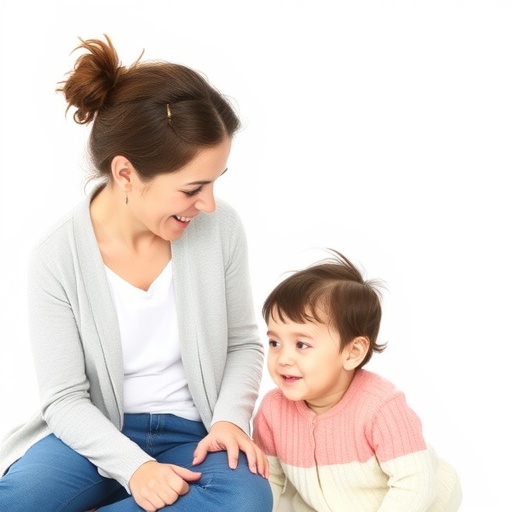In recent years, the intricate dynamics of parenting styles have emerged as a pivotal area of research in understanding early childhood emotional development. The groundbreaking study conducted by Boned-Fustel and colleagues provides a comprehensive exploration into how different parenting approaches impact the emotional growth of children during their formative years. This comprehensive analysis is not merely academic; it holds substantial implications for parents, educators, and mental health professionals working with young children.
The project meticulously reviews a rich tapestry of literature surrounding parenting styles, categorizing them primarily into four distinct types: authoritative, authoritarian, permissive, and neglectful. Each style demonstrates unique characteristics and principles that govern parent-child interactions, thereby influencing a child’s emotional framework. The nuanced distinctions among these styles offer insight into how they shape a child’s ability to navigate their feelings, form relationships, and develop coping mechanisms.
Authoritative parenting, characterized by high responsiveness and high demands, is widely regarded as the most beneficial style for emotional development. The study highlights how children raised by authoritative parents tend to exhibit higher levels of self-esteem and emotional intelligence. These children not only learn to express their emotions constructively but also develop a robust internal moral compass that guides their social interactions. The research indicates a clear correlation between authoritative parenting and the cultivation of resilience in children, equipping them to cope with life’s inevitable challenges.
Conversely, authoritarian parenting, marked by low responsiveness and high demands, often stifles emotional expression. Children raised in these environments frequently experience heightened anxiety and struggle with self-regulation. This style, as the research outlines, can result in children who are adept at following rules but may lack the emotional skills necessary for effective interpersonal relationships. Such children often find themselves grappling with feelings of inadequacy and lower self-esteem, which can have lasting effects extending into adulthood.
On the other end of the spectrum lies permissive parenting, characterized by high responsiveness but low demands. While children nurtured by permissive parents may enjoy greater freedom and fewer restrictions, the research suggests that this approach may lead to challenges in emotional management. These individuals may struggle with boundaries and expectations, leading to difficulties in achieving academic and social success. The study emphasizes the importance of a balanced approach, advocating for the integration of clear expectations alongside emotional support.
Neglectful parenting represents the most concerning style, often resulting in severe emotional and psychological deficits. Children who grow up in neglectful environments frequently lack the emotional scaffolding necessary for healthy development. The research indicates that these children are more susceptible to mental health disorders, academic struggles, and difficulties in forming meaningful relationships as they mature. The stark contrast between neglectful parenting and the other three styles underscores the critical role parents play in fostering emotional growth.
As the study delves deeper into the intersection of parenting styles and emotional intelligence, it also examines external factors that contribute to these dynamics. For instance, cultural contexts can significantly shape parenting approaches and perceptions of emotional health. The researchers highlight that in collectivist cultures, parenting styles may lean toward authoritarian practices, whereas individualistic cultures may promote more permissive or authoritative styles. This cultural lens emphasizes the need for sensitivity and adaptability among practitioners and educators when addressing emotional development in diverse populations.
Another compelling aspect of the research focuses on the role of parental mental health in shaping parenting styles. The findings indicate a strong correlation between a parent’s emotional well-being and their parenting approach. Parents struggling with their mental health are more likely to resort to neglectful or authoritarian practices, inadvertently hindering their children’s emotional development. Therefore, the study advocates for holistic family support systems that address not only the child’s needs but also the mental health of parents.
In addition to its implications for parenting and child-rearing practices, this research carries significant weight for policymakers and educators aiming to foster environments that promote healthy emotional development. The call for specialized training in emotional literacy for parents and educators is a recurrent theme of the findings. By equipping adults with the skills to nurture emotional intelligence in children, society can lay a foundational framework for healthier future generations.
Moreover, the study discusses the potential for intervention programs that specifically target families employing less effective parenting styles. These programs could provide resources, education, and support to parents, facilitating a shift toward more positive approaches that enhance emotional development in children. Early intervention is considered crucial, as the earlier a child receives support, the better their emotional and social outcomes.
In conclusion, Boned-Fustel and colleagues have crafted a seminal work that elucidates the profound impact of parenting styles on early childhood emotional development. As we continue to navigate the complexities of parenting in a modern context, studies like this serve as essential guides for fostering environments that enrich children’s emotional health. The journey toward emotional intelligence begins at home, where the seeds of healthy emotional development are sown through intentional and informed parenting choices. It is imperative that we heed these insights and work proactively to cultivate nurturing environments that allow every child to thrive emotionally.
Understanding the interplay between parenting styles and emotional development is more critical than ever. As we look to the future, we must commit to enhancing our understanding of these dynamics and their implications for public policy, education, and mental health services. The path forward is clear: an investment in parenting is an investment in the emotional well-being of our children and, by extension, society as a whole.
Subject of Research: The influence of parenting style in early childhood emotional development
Article Title: State of the art on the influence of parenting style in early childhood emotional development
Article References: Boned-Fustel, C., García-Grau, P., Morales-Murillo, C. et al. State of the art on the influence of parenting style in early childhood emotional development. Discov Psychol 5, 171 (2025). https://doi.org/10.1007/s44202-025-00426-4
Image Credits: AI Generated
DOI: https://doi.org/10.1007/s44202-025-00426-4
Keywords: Parenting styles, emotional development, authoritative, authoritarian, permissive, neglectful, cultural impact, mental health, emotional intelligence.




